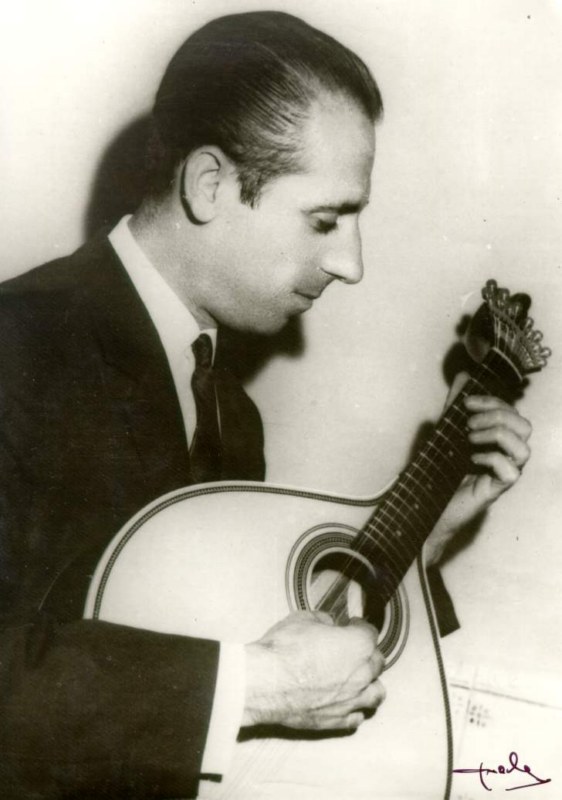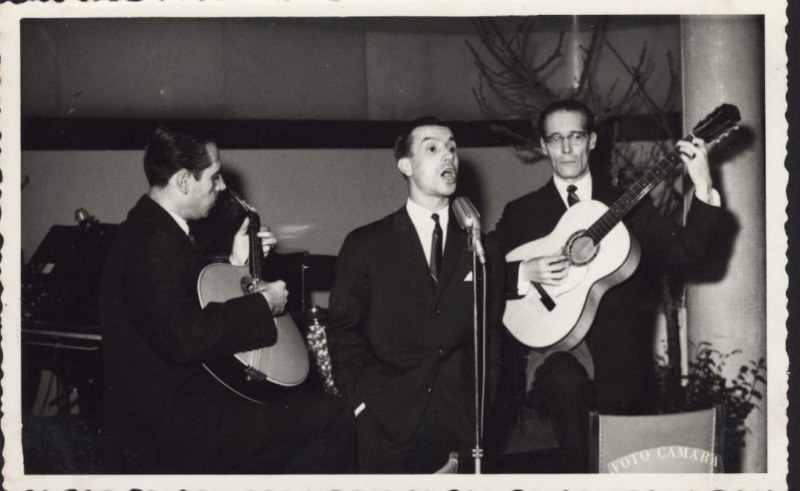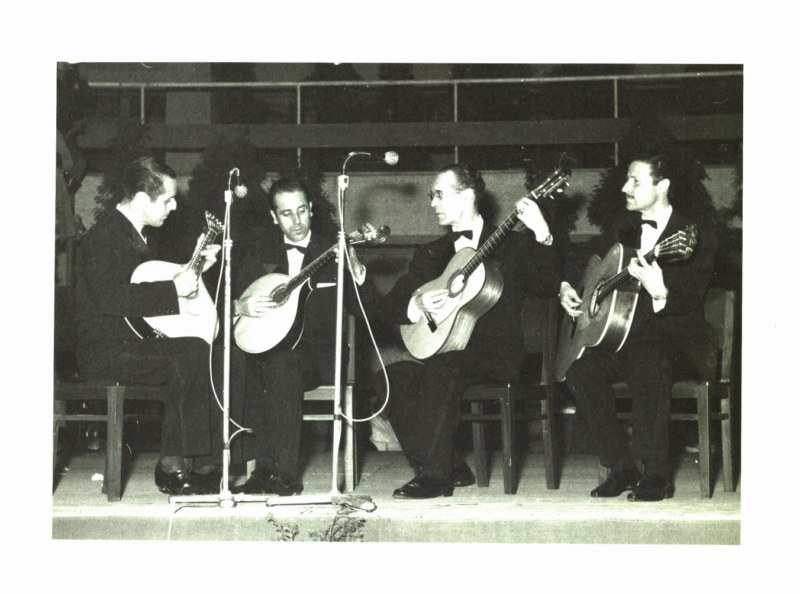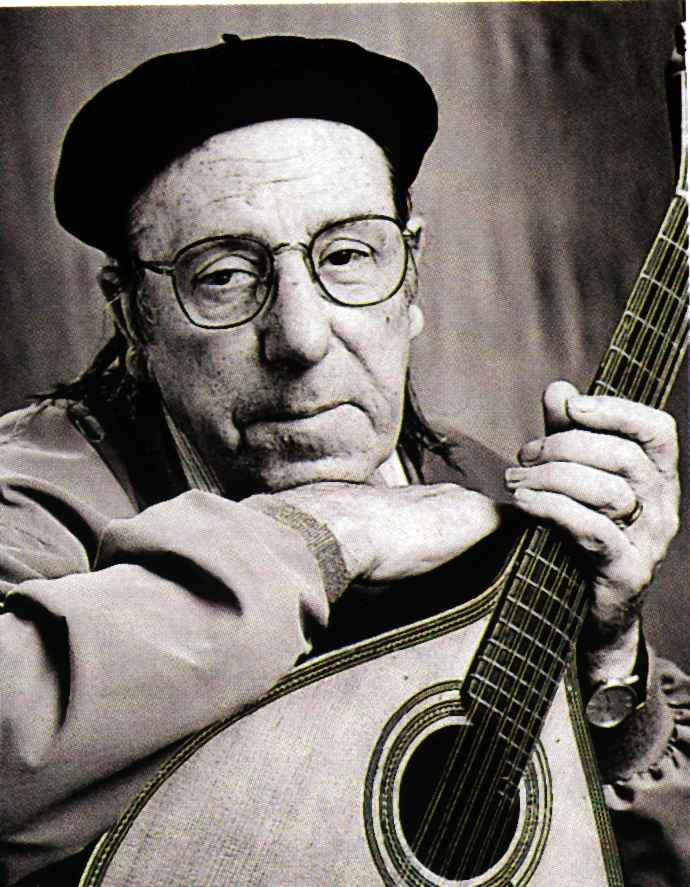Know more:
José Fontes Rocha
(N. 20 September, 1926 - M. 15 August, 2011)José Fontes Rocha, known as "Fontes Rocha", was born in Porto, at the Ramalde parish, on the 20 September 1926.
He comes from a family of musicians. His grandfather on the father side, Joaquim Rocha, was the conductor and composer of the Banda de Santiago, a civil band of the "banda regimentar" type that once used to play at bandstands and village feasts in Northern Portugal. This grandfather began to teach him the solmisation at 12 and also to play the violin. His taste for the Portuguese guitar came from his father, António da Silva Rocha, who used to play this instrument when merrymaking with his friends. He began to play the Portuguese guitar at 16, as a self-taught musician, learning how to play on his own.
From 16 to 30 he was a professional electrician in Northern Portugal, matching his profession with the activity of amateur Portuguese guitar player. He had begun to practice at 20, playing for his friends, in clubs and private feasts. His taste for the Portuguese guitar was fostered by listening to guitar playing on radio programmes, namely those broadcasted by Emissora Nacional, namely to musicians like Raul Nery, Paredes, José Nunes and Carvalhinho.
Ten years after, in 1956, he moved to Lisbon at the invitation of José Nunes and joined the cast of Restaurant "Patrício", at Calçada de Carriche, playing Portuguese guitar. When "Patrício" closed down, Fontes Rocha began working at Correios de Portugal and sporadically at "Pampilho", also located at Calçada de Carriche. Shortly after he was hired by "Adega Mesquita" and quit his electrician profession for good, deciding to become a professional guitar player. In this period he accompanied fado singer Fernando Farinha and performed at several shows in Canada and the USA (1962). At "Adega Mesquita" he had one of the most decisive encounters of his entire career, when he met Amália Rodrigues, with whom he developed a remarkable musical work.
According to Pedro Caldeira Cabral, he followed "the style patterns of Portuguese guitar players Armandinho and José Nunes, whose influence on his kind of sound can be easily recognised. Fontes Rocha nonetheless developed with remarkable persistence a series of improvements in the sonority of Portuguese guitars, introducing “sordino” techniques, re-designing the shape of nails and the angle for fingering the chords, etc. " (Pedro Caldeira Cabral, “A Guitarra Portuguesa”, Lisboa, Ediclube, 1999).
He was a member of the Raul Nery Guitar Ensemble (which also included Júlio Gomes and Joel Pina), travelling with them abroad to perform and also to accompany Maria Teresa de Noronha. As a player in this ensemble he performed every week in programmes at Emissora Nacional, playing 4 different pieces. This required rehearsing and a high level of professionalism, as, according to Fontes Rocha, it is rather complicated to have four instruments playing simultaneously.
As member of the Raul Nery Guitar Ensemble, Fontes Rocha also performed with the André Kostelanetz Orchestra in the 1969-1970 season, contributing to the great success of Amália Rodrigues at the Lincoln Center in New York City.
In the 1960’s he became famous as the guitar player of Amália Rodrigues, one of the peaks in his artistic career. He played with Amália on virtually every stage in the world, developing a high-quality work in terms of composition and sonority, in close cooperation with Alain Oulman, combined with a careful choice of poems. Of his many performances with the fado singer, special reference should be made to the Olympia de Paris, in 1968, for Portuguese migrants. Carlos Paredes, Simone de Oliveira, Duo Ouro Negro and the Ballet Group Verde Gaio also participated in the show.
In addition to the works recorded with the Raul Nery Guitar Ensemble, Fontes Rocha published three more records with guitar performances. He played for Natália Correia on a poem record and accompanied many fado singers on record, namely Ada de Castro, António Mourão, Carlos do Carmo (in his LP "Por morrer uma andorinha"), Fernando Farinha, João Braga, Maria Amélia Proença and Maria da Fé, among many others.
Of his recordings with Amália Rodrigues, Fontes Rocha proudly makes special reference to the work done for the record "Com Que Voz", with musical score by Alain Oulman and arrangements and sound by the guitar player. According to him, "I had the luck of playing in her best work. That record received awards all over the world and a prize that is only given to major erudite music (…). I made that record (…) I picked my Coimbra guitar (tuned up by Artur Paredes for the Coimbra fado). And I made that record with that Portuguese guitar tuned up at Coimbra, which is absolutely right for this music and also for the poems." (Baptista Bastos, "Fado Falado", Lisboa, Ediclube, 1999).
José Fontes Rocha is the author of musical scores for several fados, some of which quite famous, like "Quentes e Boas" (with lyrics by José Luís Gordo), "Fado Isabel" (fado corrido, sung with several lyrics), "Anda o Sol na minha rua" (lyrics by David Mourão-Ferreira), "Lavava no rio lavava" and "Trago o Fado nos sentidos" (both with poems by Amália). He also composed melodies for Portuguese guitar performances, like "Valsa em Si menor", "Variações à Roda de uma Valsa", "Variações em Ré menor", "Variações em Sol Maior" and "Evocação em Mi menor".
In 2005 he received the Amália Rodrigues Award for the Best Fado Composer.
His talent and sensitivity were recognized in a fair tribute on occasion of his 80th birthday, held on the 19 October 2006 at Fórum Lisboa, with the participation of João Braga, Maria da Fé, Maria Armanda, Joana Amendoeira, Ana Sofia Varela, Gonçalo Salgueiro, Miguel Capucho, Rodrigo Costa Félix, Carlos Gonçalves, Carlos Manuel Proença, Joel Pina, Raul Nery and Ricardo Rocha, who performed melodies composed by him.
José Fontes Rocha passed away in 2011 but he still remains a source of inspiration for all fado musicians and singers.
Source:
Baptista-Bastos (1999), "Fado Falado", Col. "Um Século de Fado", Lisboa, Ediclube;
Caldeira Cabral, Pedro (1999), "A Guitarra Portuguesa", Col. "Um Século de Fado", Lisboa, Ediclube.

José Fontes Rocha, s/d.

José Fontes Rocha, Fernando Farinha e Júlio Gomes, s/d.

Conjunto de Guitarras Raul Nery - Raul Nery, José Fontes Rocha, Júlio Gomes e Joel Pina, s/d.

José Fontes Rocha. Photo: José Santos
-
Variações em Ré Menor José Fontes Rocha (José Fontes Rocha)